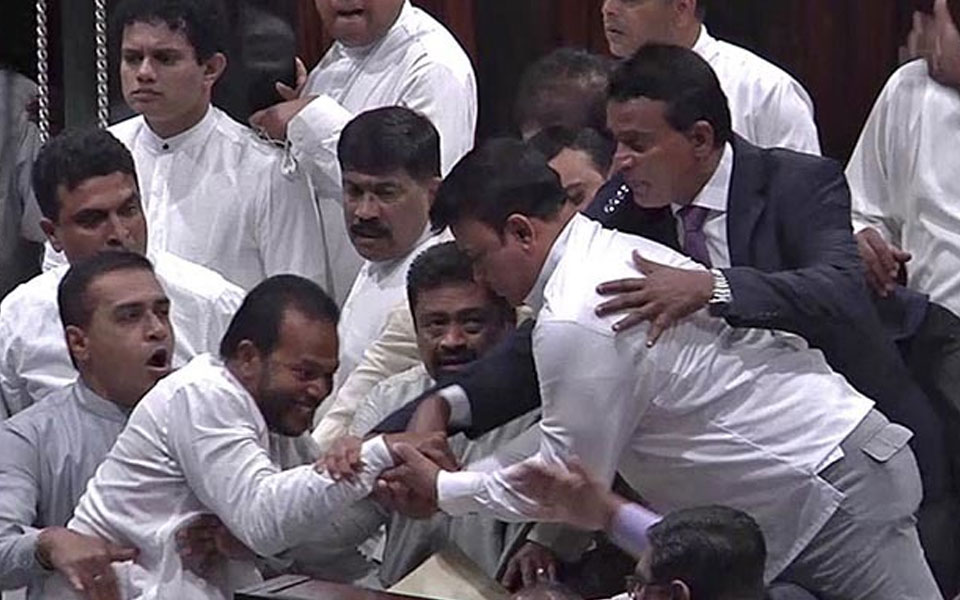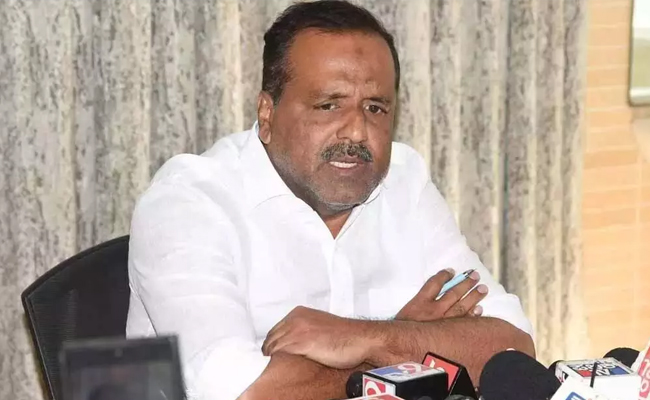Colombo, Nov 15 : Violent scenes were witnessed in the Sri Lankan Parliament on Thursday as agitated lawmakers loyal to President Maithripala Sirisena and Prime Minister Mahinda Rajapaksa surrounded the Speaker in his chair after the premier, who lost a floor test, demanded fresh elections to resolve the political turmoil.
Trouble erupted when Speaker Karu Jayasuriya agreed to a request from ousted premier Ranil Wickremesinghe's United National Party that a vote be taken on a statement made by Rajapaksa demanding fresh polls.
Jayasuriya had allowed Rajapaksa to make a statement as a member of parliament after stating that he does not recognise the claim of the Sri Lanka Freedom Party (SLFP) leader who lost a no-confidence motion on Wednesday.
"I was the president and premier, so this prime minister's post is not important," Rajapaksa said.
"I urge all 225 members to join me in calling for a fresh election. We want a general election," he said, adding that a fresh election was the best way to resolve the crisis.
UNP legislator Lakshman Kiriella urged Jayasuriya to take a vote by name, showing the loss of confidence over Rajapaksa's remarks.
Jayasuriya asked the House if it agreed and with resounding voices of 'Aye' he proceeded to take the vote. He was immediately surrounded by Sirisena and Rajapaksa's MPs who were protesting against Jayasuriya's decision to take the vote.
"I am the Speaker and I decide," Jayasuriya told the angry lawmakers as UNP MPs formed a ring around the Speaker's chair to shield Jayasuriya.
"They are trying to assault the Speaker," UNP legislator Harsha de Silva tweeted from the House.
Objects were thrown at the Speaker's chair and at least one MP was seen leaving the chamber bleeding, an official said.
The commotion continued for about half an hour before Jayasuriya adjourned the House.
"We are the lawful government and we will sit in the government benches today," Ajith P Perera, a senior UNP legislator said earlier. The UNP had sat on the opposition benches during the no-trust vote.
Rajapaksa's side has disputed the no-trust motion, saying proper procedure was not followed and accused Jayasuriya of bias towards his own party.
Since the Speaker had ruled that Rajapaksa had no majority, Wickremesinghe remains the lawful premier, the UNP claimed.
The UNP said they would boycott a meeting called by Sirisena with political parties which backed the motion against Rajapaksa on Wednesday. This was after a strongly-worded letter from Sirisena to Jayasuriya last night.
Sirisena, in response to an official communique by Jayasuriya on the vote in parliament, told the Speaker that a prime minister does not necessarily require a parliamentary majority, that Jayasuriya had violated parliamentary procedures and standing orders of parliament in conducting the no-trust motion against Rajapaksa, and that he as president was the sole authority in appointing a prime minister.
Parliament on Wednesday passed the no-confidence motion against Rajapaksa who was installed by as premier by Sirisena in a controversial move, after the Supreme Court overturned the presidential decree to dissolve the House and hold snap polls on January 5.
Amid raucous scenes, Parliament on Wednesday met for the first time since October 26, when Sirisena sacked premier Wickremesinghe, installed Rajapaksa in his place and suspended the House, plunging the island nation into an unprecedented Constitutional crisis.
The vote of no confidence against Rajapaksa has further complicated the political crisis as the former strongman has rejected the outcome of the floor test. It is not yet clear whether Rajapaksa will resign or whether the ousted Wickremesinghe, who has the support of 122 lawmakers, will return to power.
The passing of the no-confidence motion comes as a major blow to Sirisena and is a victory for Wickremesinghe.
Let the Truth be known. If you read VB and like VB, please be a VB Supporter and Help us deliver the Truth to one and all.
Mangaluru (Karnataka) (PTI): Karnataka Legislative Assembly Speaker U T Khader on Wednesday sought an inquiry after a large number of Aadhaar cards were found on the banks of the Nethravathi River here.
The cards were found at Farangipete in Pudu village of his Mangaluru Assembly constituency.
Khader, in a note to the Project Manager of the Unique Identification Authority of India (UIDAI), Bengaluru, sought immediate intervention and necessary action against those responsible.
In the note dated March 4, he said that local residents noticed the Aadhaar cards along the riverbank on March 3.
Following information received from the public, the Pudu Gram Panchayat president and villagers collected the Aadhaar cards found scattered in the area. They subsequently brought the matter to his attention and the concerned authorities, he said.
Expressing concern over the incident, the Speaker has directed that a thorough investigation be conducted to ascertain how such a large number of Aadhaar cards ended up on the riverbank and to identify those responsible.
He instructed officials to initiate appropriate legal action through the concerned department at the earliest.





